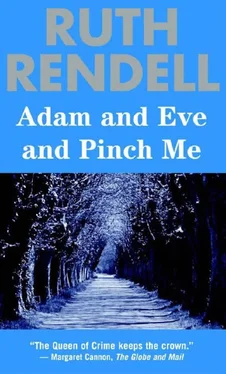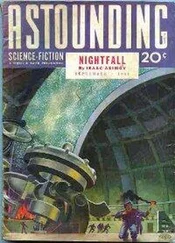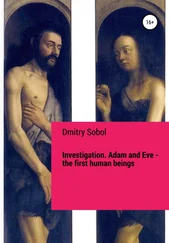She forgot to eat. Having shared an almost nightly bottle of wine with Jeff, she could no longer bear the pain of tasting it. A woman who lost weight easily and quickly, she felt her hip bones protruding, her elbows sharp. At this rate-and she managed a wry joke with herself-Matthew would want her on his program. If only Matthew would come to her! If only Michelle would come! The phone had stopped ringing. Something hindered her from lifting the receiver and making a call herself; she couldn’t physically perform the actions. As for going to them, she had a vision of herself stepping out of her front door, ringing their bell, and, when the door opened, being stared at as if they’d never seen her before, as if she were some stray caller wanting to promote a product or give away a tract.
At night she took sleeping pills, Temazepam. They sent her to sleep but it was an uneasy sleep and full of dreams. Always of Jeff. In one he came back from some foreign trip he’d been on. She’d thought he was dead and felt boundless joy at their reunion, as he promised he’d never go away again. Waking to reality was one of the worst experiences of her life.
The newspapers continued to be delivered and thrown into the recycling bin. She’d need to take it out to the street one day before it got too heavy to lift, but she’d have to leave the house on Monday anyway, somehow get herself to the tube and the City and London Wall. Taking the papers from the doormat on Saturday morning, though hating them, though determined as ever not to look, she caught sight in the front-page photograph of a woman she recognized. It was, surely it was, Jeff’s ex-wife.
Only she wasn’t his ex -wife. They’d never been divorced. Fiona felt a shaft of intense pain run through her body as if she too had been stabbed with a long, sharp knife. She was indifferent as to whether Zillah Melcombe-Smith had knowingly committed bigamy or not. Jeff had lied again and this lie was infinitely worse than telling her he’d booked a wedding date when he hadn’t. He couldn’t book a date, as he was married already.
Fiona dropped the paper. She lay facedown on the hall floor in an agony of grief and, strangely, shame.
“I shall sue these trashy rags for libel,” Jims said when, for five minutes, Violent Crimes left him alone with his solicitor. He had completely forgotten deriding Zillah for making much the same threat.
“Have you got a million pounds to spare?” Damien Pritchard was a little older than his client, but not unlike him to look at, being also tall, dark, classic-featured, and gay. “A million you wouldn’t mind dropping down a drain or giving to a beggar?”
“Of course I haven’t. I wouldn’t need to. I’ll win.”
“Oh, please. Do me a favor. Let me tell you something. A solicitor came to live next door to my parents when I was a kid. I’ve always remembered my father saying to my mother, he’s a lawyer, don’t touch his ears. Actually, I think it had a lot to do with making me want to be one. Well, the same goes for newspaper editors. Don’t touch their ears.” Damien shook his head in exasperation. “And now, can’t you really come up with a better alibi than what you expect the Plod to swallow? Oh, God, here they are, coming back.”
Jims could, of course, improve on his alibi. He could have told the truth. But that seemed almost the worst thing he could do and its results the worst that could happen to him. Once more he sat down at that bare table with Damien next to him and Violent Crimes and Miss Demeanor facing them. They all sat in the kind of chairs Jims wouldn’t even have had in his garden shed. At least they were still calling him by his surname and honorific, though he wondered how long that would last.
“The difficulty is that no one confirms your presence at Fredington Crucis House during Friday afternoon and evening, Mr. Melcombe-Smith. Two callers at the house noticed that your car was absent.”
“Who?”
“You know I’m not at liberty to tell you that. You still maintain you spent Friday evening there? And stayed over Friday night?”
“My client,” said Damien, “has already told you so. Several times.”
Jims was starting to get cross. “Why would I have killed the guy, anyway? For what possible reason would I have stuck a knife in him?”
“Well, Mr. Melcombe-Smith,” said Miss, or Detective Inspector, Demeanor, “he was married to the lady with whom you’d been through a form of marriage.” She smiled very faintly as Jims winced. “It would have been very much in your interest to have him out of the way, especially if he’d threatened to reveal the truth to, say, a newspaper.”
“So what? Everybody else reveals it. Anyway, he wasn’t blackmailing me. I thought Zillah and he had never been married. I hadn’t seen him for years.” Like many in his position, Jims was anxious to be scrupulous about telling the truth in every area of questioning except one. “Well, two years.”
The words “so you say” were plainly written on the woman’s face. “You came back to London on Friday afternoon, didn’t you, Mr. Melcombe-Smith?”
Jims was silent. He was hesitating. He could feel doubt, a loss of confidence in his friend and client, by some strange means emanating from Damien. Violent Crimes was looking at him. Behind them, on the ocher-colored wall, a crack in the plaster ran from ceiling to skirting board. It was shaped, Jims thought, like the silhouette of a man with an erection. He looked away.
Damien, who was a good guy, a real friend in need despite his wavering trust, said softly, “If you don’t mean to charge Mr. Melcombe-Smith, and I don’t think you do, you’re obliged to let him go home now.”
Violent Crimes knew a trick worth two of that. “You drove back to London to fetch something. Something you’d forgotten. I’ve been wondering if it was the notes for your speech to the Countryside Alliance. It’s a coincidence, but the chief constable of Wessex happened to be there.”
Jims tried to remember if he’d referred to the missing notes and his return to retrieve them when he was making that speech. He couldn’t remember. And it wouldn’t matter whether he’d referred to them or not . It was enough that this policeman had the sense, the skill, if you like, to suggest that he had. It didn’t even matter whether it was true about the chief constable. He looked at Damien in despair and Damien said nothing.
“Mr. Melcombe-Smith?”
They contrived by the tone of their voices to make his name ridiculous. Jims thought of appealing to them to keep what he might confess to them a secret. Would they agree? Or should he trust to luck? He considered the procedures he read about in the newspapers that preceded murder trials, or any court cases come to that. The police never told the media how they arrived at arresting someone or charging someone or how they agreed to or exploded alibis. There must be something in law which forbade their doing so. Not for the first time he wished he’d read law instead of history and practiced for a while at the criminal bar.
“Mr. Melcombe-Smith?”
“All right, I did come back to London.” He dared not look at Damien. “I had, as you say, forgotten my notes. I started the drive back soon after one and had something to eat at a-well, a sort of cafe on the A30.” A sound, something between a sniff and a grunt, came from Damien. Or maybe not, perhaps he’d imagined it. “I’m not sure where. They might remember me. The traffic was bad. I didn’t get home till seven.”
It was interesting, almost disconcerting, the way they accepted that up till now he’d lied. They didn’t comment. Neither said, “So you’ve been lying to us” or “Why didn’t you tell the truth before?” It was as if they were entirely used to a kind of endemic mendacity, it was what they expected. Jims began to feel sick.
Читать дальше











